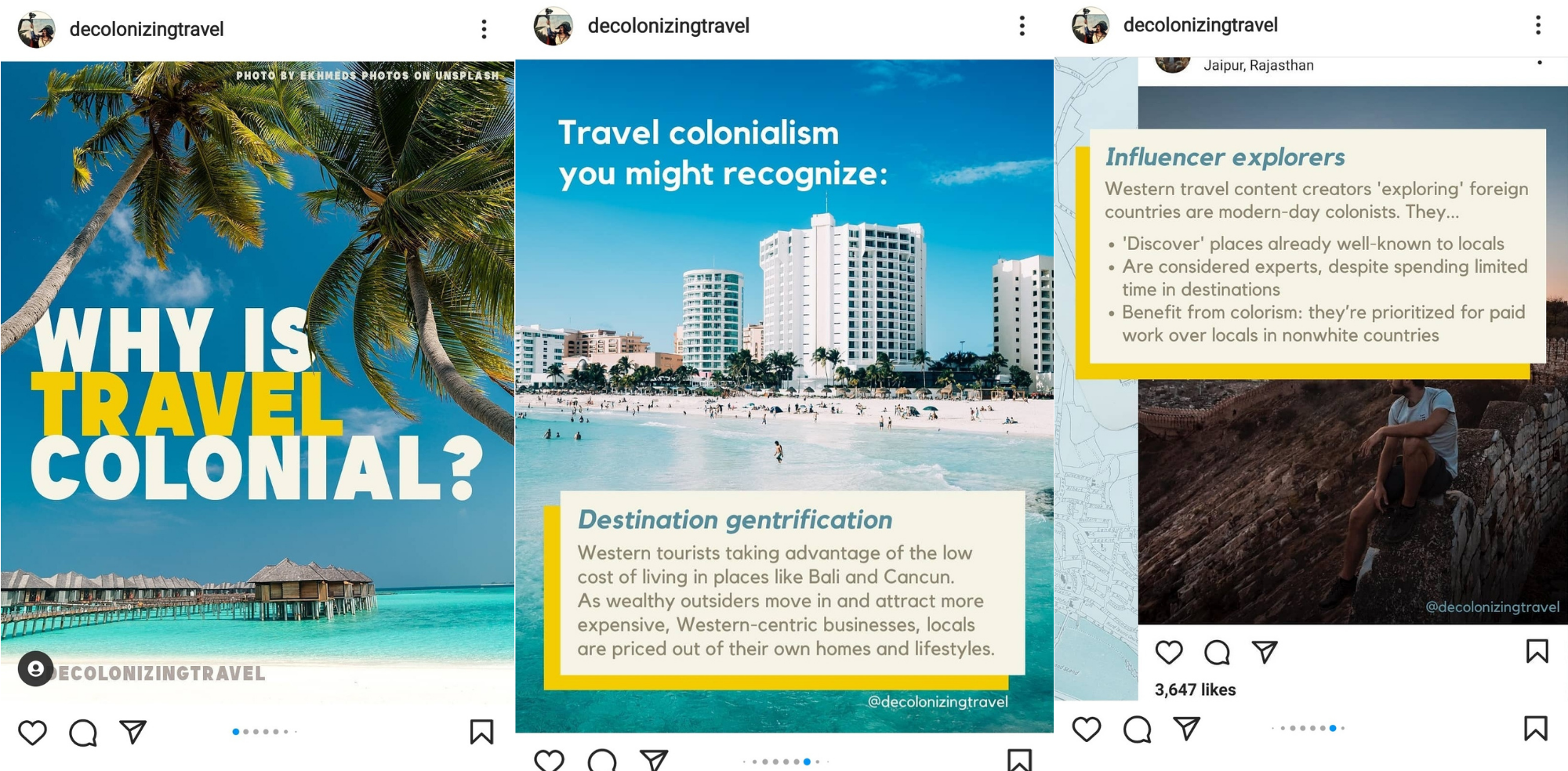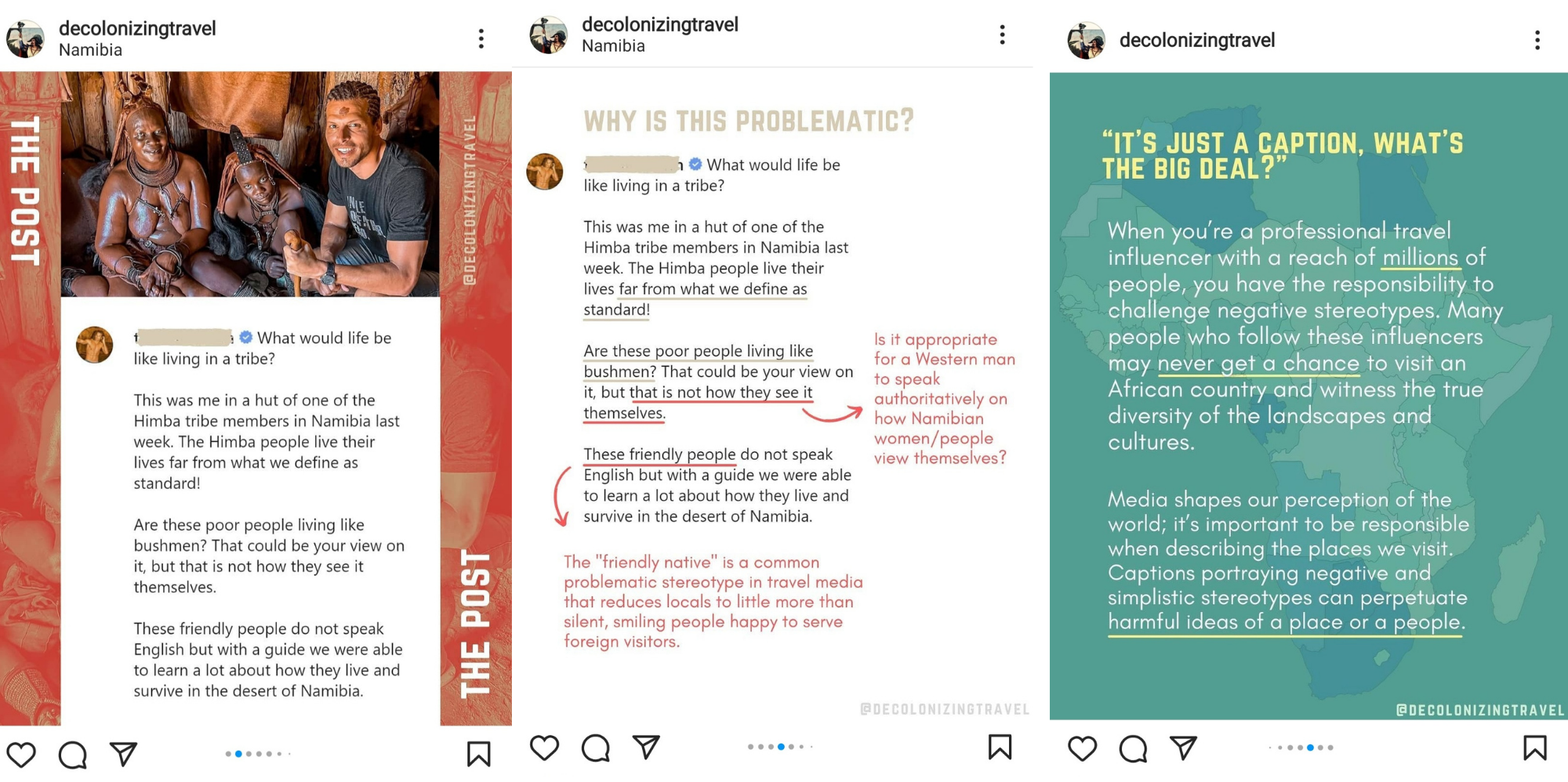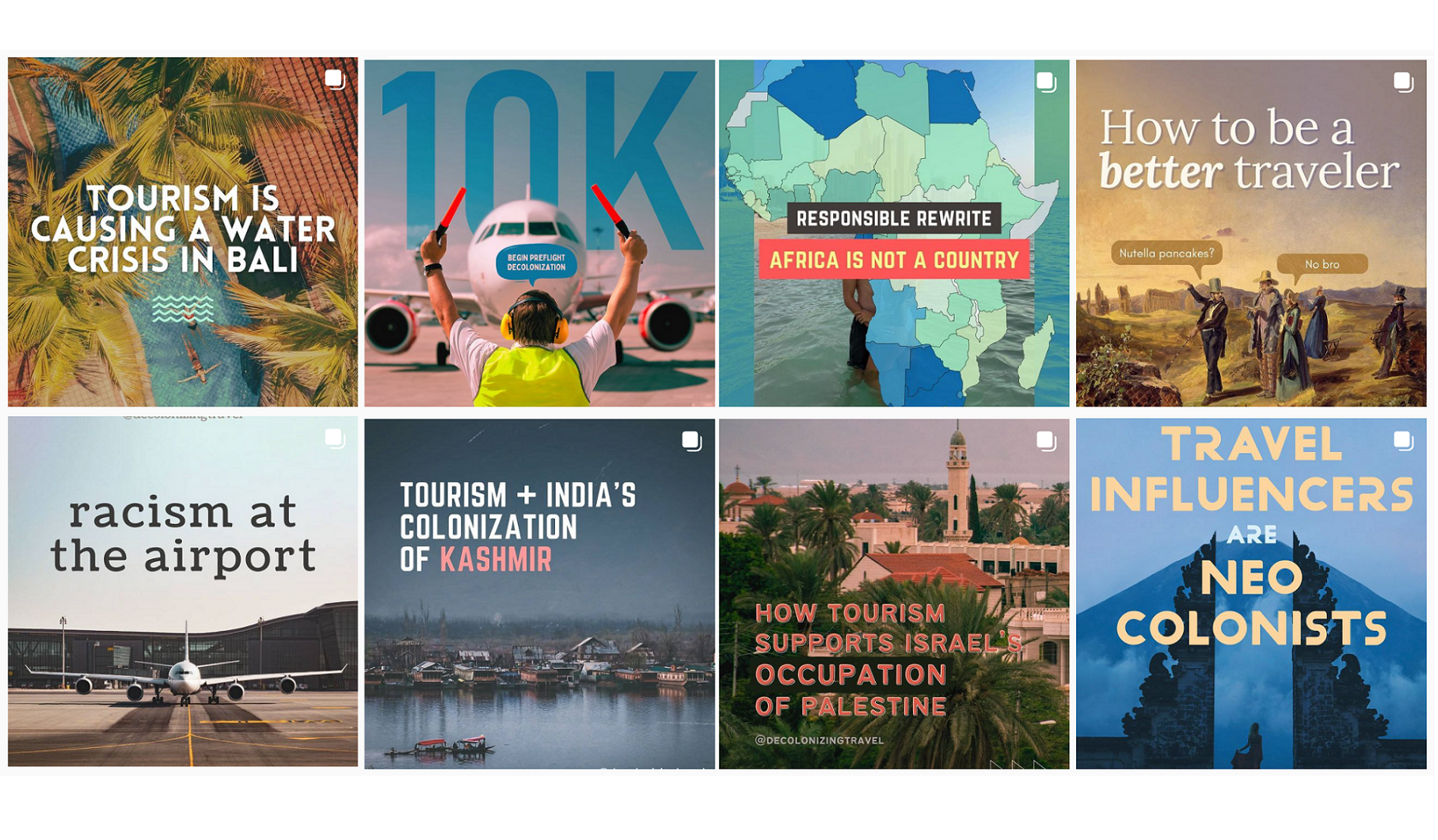On March 26, 2021, an Instagram account called @DecolonizingTravel made its inaugural post and with just 13 posts, grew its audience to 14,000 followers.
Posts are infrequent and intermittent but heavy hitting, drawing attention to issues like the water crisis in Bali, problematic language, entitlement and racism. In some posts, the account blatantly calls out travel influencers for tone-deaf captions and offers what it calls a “responsible rewrite.”
Noticeably absent from @DecolonizingTravel's bio is the visibility of its creators which prompted Canadian Traveller to reach out. We learned the account was founded by travellers Lydia (@thoughtfulwanders), Alex (@lostwithpurpose) and Ali (@iranian_nomad)–who, despite the complexity of the topics they tackle, are united by a simple mission: to help people think more critically about travel.
CT contributor Johanna Read chatted with Lydia and Ali to learn more about their personal histories, motivations and the response they’ve received from Instagram users.
Note: this interview has been edited and condensed for clarity.
 Instagram.com/DecolonizingTravel
Instagram.com/DecolonizingTravel
What’s the overall goal of @DecolonizingTravel?
Ali: We want to make people better travellers. Do less harm to the destination you go to, respect local culture, and try to learn something from your travels. It’s not just about trying to travel in a less harmful way, but also trying to learn while you’re travelling.
How did @DecolonizingTravel come about?
Lydia: Alex and I were talking about travel, the industry, influencers, and our qualms about it. You see some influencers and it’s like—all you guys are doing is trying to promote and make money, you're not actually interested in education.
I was always fascinated with the concept of how you can make travel educational, actually challenge people’s world views and get them to become more socially progressive and aware.
So, Alex and I came up with the idea to create an Instagram account and Ali joined after we had published a few posts.
At first, it was supposed to be very casual, dropping our thoughts and maybe memes. Alex is much more of a designer and wanted everything to look nice. We started to create posts and then the brand just kind of formed itself.
“Decolonizing Travel” was a name that really resonated. The first name was probably “Neocolonialists” and it was supposed to be just about influencers but then we broadened it.
Tell us a little about the three of you.
 Ali: I was born in Iran, lived in Vancouver when I was young, returned to Iran, and came back to Canada for my PhD in Montreal. Growing up in Canada, I was always trying to hide my identity in order to fit in. Then I started realizing these misconceptions seem to be universal and can lead to divisions, even hatred. As I grew older, I started embracing my culture and thought that because I understand two cultures, I'm a suitable person to help fill the knowledge gap to educate people.
Ali: I was born in Iran, lived in Vancouver when I was young, returned to Iran, and came back to Canada for my PhD in Montreal. Growing up in Canada, I was always trying to hide my identity in order to fit in. Then I started realizing these misconceptions seem to be universal and can lead to divisions, even hatred. As I grew older, I started embracing my culture and thought that because I understand two cultures, I'm a suitable person to help fill the knowledge gap to educate people.
Lydia: I identify as a “third culture kid”—I’m Taiwanese and Chinese, grew up in South Africa and Taiwan, and went to college in the U.S. I’ve often felt like an outsider and that led me to embrace travel as a way of life. I’ve seen so much inequality travelling—global northern travellers treating the rest of the world as their playground. I was privileged enough to know how that felt and how it felt to be an outsider. I studied sociology and anthropology and became very interested in identities, critical theory and social justice. I blog about these topics at Thoughtful Wanders.
Alex is the founder of the Lost with Purpose travel blog. She’s Filipino-British-American, a mixed-identity person who backpacked throughout the Global South as a solo female traveller. She’s very vocal about the intersection of social justice and travel.
What are some of the issues you’re trying to address with @DecolonizingTravel?
Ali: A lot of people aren’t travelling to discover new things but instead travelling to reaffirm stereotypes. Iran is an example. Many foreign travellers who come here are just reaffirming stereotypes of mosque tiles and desert scenes. They’re all just repeating the same thing—even the same restaurants—rather than trying to challenge themselves and discover things they haven’t been told in the media. I’ve seen this pattern repeating in every country I’ve been to. With @DecolonizingTravel, we’re trying to get people to see things from the view of locals rather than just themselves.
Lydia: Alex and I were chatting recently about people from privileged countries who go backpacking. It’s a great way to travel—you're meeting locals and seeing how hospitable people are—but most backpackers have more global power and more resources than the people who they’re accepting food, rides and other resources from. We want people to question the line between exploitation and wanting to feel a culture.
What kind of response have you been getting to your posts?
Lydia: Overall, it's been very positive. We get comments like "You're our favourite page" and "You make me think about things I never really thought about before.”
Ali: Our followers are people who have either felt these different issues themselves or are happy to be learning about them. We're very open to discussing things in our DMs and try to engage with our followers. But some people want to keep a closed mind and we realize they're not interested in discussion, [they] just want to impose their opinion on us.
 Instagram.com/DecolonizingTravel
Instagram.com/DecolonizingTravel
What are one or two key things you want people to know to be better travellers?
Ali: When you’re travelling, I think the most important question you should ask is “Is this something that I would want people to be doing to me if they were visiting my city or neighbourhood?” And if the answer is “no,” just don't do it. Very simple.
Always try to see things from the perspective of locals and appreciate the fact that locals are accepting you. Don’t complain or disrespect things just because they’re different. When you're travelling, you shouldn't expect to have all the comforts of home or [expect] everyone will understand English.
Any parting advice for people who want to help decolonize travel?
Lydia: Travel both enhances your worldview and enables or perpetuates the same inequalities that already exist. I want people to do a lot of introspection instead of getting annoyed or angry. If something isn’t how you’d want it, like if there’s no AC, just take a moment to self-reflect: Why am I reacting this way? Why do I have this and they do not? And maybe it can lead to thoughts about inequality, that you come from a very rich country, and why your country is rich in the first place.


